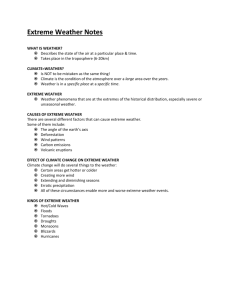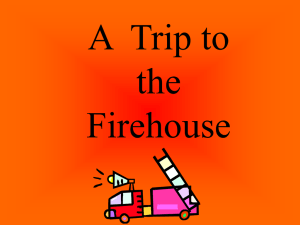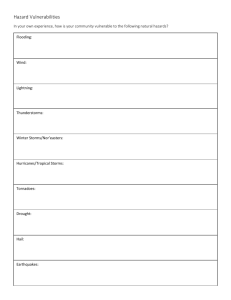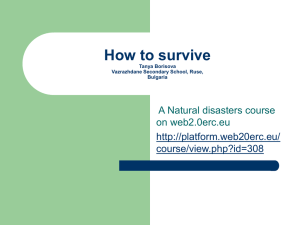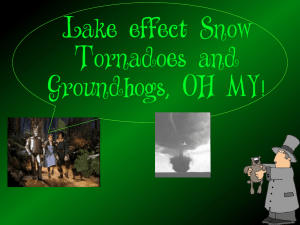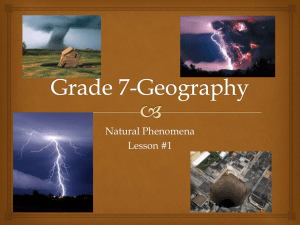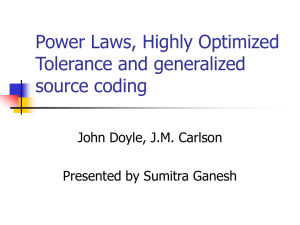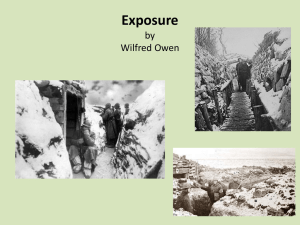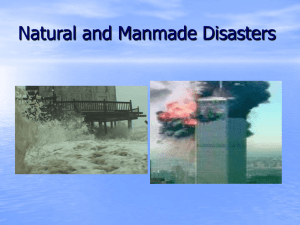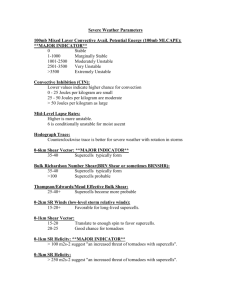Natural Disasters - Causes & Effect 2011
advertisement
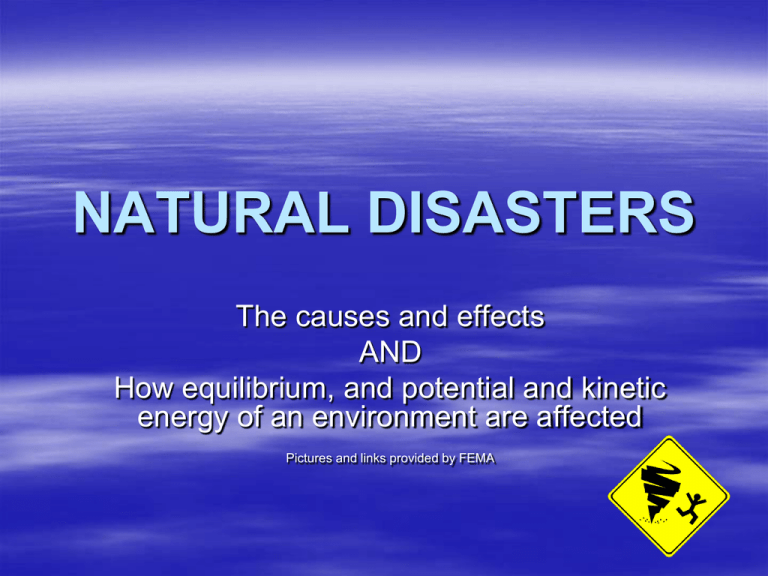
NATURAL DISASTERS The causes and effects AND How equilibrium, and potential and kinetic energy of an environment are affected Pictures and links provided by FEMA Which of the following can happen in New York State? tornadoes hurricanes floods or droughts forest fires earthquakes volcanoes tsunamis severe thunderstorms or lightning blizzards or avalanches The world is always changing. Natural disasters are changes to the environment that are so great they may cause changes to the shape of the land, destruction of property, or affect the lives of people and other living things. The Earth is dynamic. Great changes occur deep inside the Earth and on its surface each day. The changes that occur on the outer part of the Earth, such as floods or tornadoes, happen because of different kinds of weather conditions; specifically, severe changes in the weather. HURRICANES and TORNADOES Hurricanes and tornadoes are fierce storms that cover large areas with strong winds from 74 - 250+ mph that spin counterclockwise. During these deadly storms, trees can be uprooted, buildings destroyed, cars overturned, power lines downed, and lives can be lost. Hurricanes are extremely dangerous because of high winds and flooding. TSUNAMIS A tsunami is a giant sea wave that crosses the ocean toward land building in size and strength as it gains energy. Tsunamis occur as a result of movement caused by the Earth, either from an earthquake or a landslide. When the tsunami reaches the coast, it is highly destructive because of the huge size of the waves, which can be over 100 feet high, and the severe flooding it causes. Tsunamis are extremely dangerous and deadly. Japanese tsunami caused by earthquake (March 2011) TORNADOES Found mainly in the mid-west plains area of the U.S. known as Tornado Alley HURRICANES Hurricanes are found mostly along coastal areas where warm ocean currents travel westward across the Atlantic Ocean toward the East coast. FLOODS A flood is caused by an overflow of water which covers land that is usually either too dry and rainwater cannot penetrate the ground because it is too hard or because the ground is already saturated with water from too much rain so it causes runoff flood water. Floods often occur in the Spring due to heavy rain or is caused by snow melting and the rivers burst their banks and overflow. Costal floods are caused by high tides, a rise in sea level, storm waves or a tsunami. FLOODS Major flooding occurs in low lying areas or where major rain events can occur FOREST FIRES (WILD FIRES) Wild fires are common in dry places with numerous forests and little rain DROUGHT A drought is the lack of rain for a long time. In 1968, a severe drought began in Africa. Children born during that year were five years old before rain fell again. FOREST FIRES (WILD FIRES) Fires can quickly burn wildly out of control in dry areas of forest. Fires are caused by lightning, sparks of electricity or careless people. Strong winds may blow a forest fire to areas where people live. Once the area has been destroyed by fire, without the vegetation to hold the soil in place, the area is susceptible to massive landslides or mudslides. EARTHQUAKES An earthquake is a violent shaking of the ground. Sometimes it is so strong that the ground splits apart. When parts of the Earth, called tectonic plates, interact with each other giant shock waves move upwards towards the surface causing the earthquake. The area on the surface of the Earth where the most damage occurs is called the epicenter. DUCK, COVER, HOLD! EARTHQUAKES Earthquakes are mainly found along fault line boundaries such as the west coast where North America once separated from the super landmass called Pangea SAN ANDREAS FAULT California VOLCANOES A volcanic eruption is the spurting out of gases and hot lava from the asthenosphere through an opening in the Earth’s crust. Pressure from deep inside the Earth forces ash, gas and molten rock to the surface. Some volcanic eruptions are explosive such as Mount St. Helens. VOLCANOES Active volcanoes in the U.S. are found mainly in the area of the Ring of Fire, which includes the states of Hawaii, Alaska, Oregon, California, and Washington. The greatest chance of eruptions occur near areas where many people live such as Hawaii and Alaska. SEVERE THUNDERSTORMS AND LIGHTNING Thunderstorms are most likely to occur in the spring and summer months and during the afternoon and evening hours, but they can occur year-round and at all hours of the day or night. Along the Gulf Coast and across the southeastern and western U.S., most thunderstorms occur during the afternoon. Thunderstorms often occur in the late afternoon and at night in the central U.S. Florida has the most lightning strikes. BLIZZARDS Blizzards can happen in NYS because of weather conditions known as lake effect snow. When cold arctic air meets the warmer waters in the large lakes in central NYS, conditions are ideal for the formation of lake effect snow. If the snow fall continues for long periods of time and is accompanied by severe winds, a blizzard may develop. Blizzards can be deadly because the strong winds can cause hazardous road conditions such as “white-outs” or “black ice”, and knock down trees and power lines, causing homes to be without heat and power for days. AVALANCHES An avalanche is a rapid movement of snow, ice and rock down a mountainside. Avalanches happen very suddenly and can move as fast as a racing car up to 124mph. Avalanches can be caused by – • snow melting quickly • snow freezing, melting then freezing again • someone skiing • a loud noise or an Earth tremor LANDSLIDES The Tully Valley landslide that occurred on April 27, 1993, just south of Syracuse, New York, is considered one of the worst natural disasters in U.S. history. This natural disaster fortunately did not cause any loss of life, but caused much destruction to property and loss of many homes in the area. The massive rock slide down the mountainside lasted less than an hour, covered roadways with mud 15 feet deep, and people had to be rescued by helicopter from the rooftops of their homes. Tully Valley landslide (April 27, 1993) HOW THE ENVIRONMENT AND LIVES ARE AFFECTED BY NATURAL DISASTERS Natural Disasters are events that occur naturally on the Earth. They affect the characteristics of the environment and living things, and have ultimately influenced the history of the world. During a natural disaster, potential energy becomes kinetic energy and alters the equilibrium in the environment. ND 2 MP RESEARCH PROJECT
